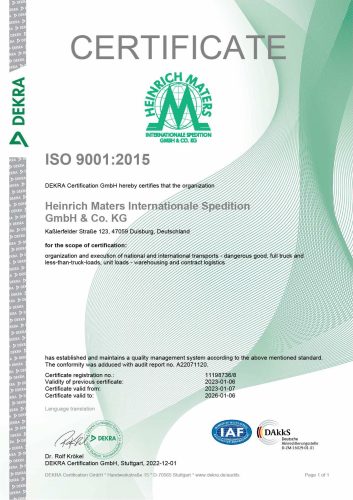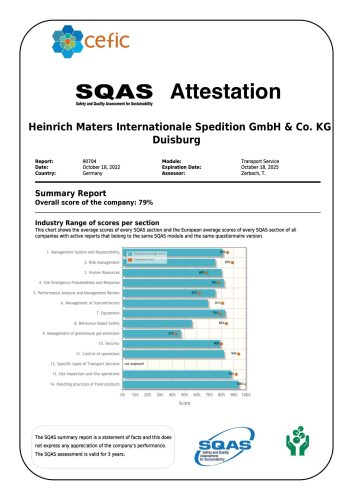
Our certificates
Quality management system with high standards
Quality and customer satisfaction, efficiency and speed of response are among the key factors for success as a logistics service provider. This requires high process quality and precise order fulfilment – ensured by a certified quality management system.
The ISO 9001 standard is the most widely used standard in quality management. In accordance with this standard, we have a process-oriented quality management system for the organisation and execution of national and international shipments (hazardous goods, full and part loads, general cargo) and warehousing.
Initial certification: 30.10.1998
Last recertification audit: 18.11.2022
Certificate valid from 07.01.2023 – 06.01.2026


The audit guidelines of the European Chemical Industry Council (CEFIC) have proven their worth as a monitoring tool for assessing and monitoring the performance of logistics service providers. The quality we provide as a partner to shippers in the chemical industry for the road transport of hazardous goods (including GMP) is regularly assessed every 3 years. This assessment includes compliance with legal regulations with regard to the protection of employees, the population and the environment and goes far beyond the requirements of ISO 9001. Components of the certification according to ISO 14001 are also already part of the assessment. The successful SQAS assessment demonstrates the highest quality, environmental and safety standards in our company.
First assessment: 08.12.2004
Last assessment: 17.-19.10.2022
Report No.: 90704
Identification of the CO2 footprint
We regularly collect and analyse key figures on CO2 emissions with the aim of continuously reducing our CO2 footprint. We not only consider the CO2 values of the entire volume transported by our own fleet, but can also use a tool to determine and compare the CO2 emissions of each individual transport. In addition, we also take into account the energy consumption of our buildings and the resources we use to provide services.
Low-emission vehicles and in-house ECO training
Our fleet has already been consistently converted to the latest generation of vehicles in recent years. These vehicles are equipped with systems to control and reduce fuel consumption and thus promote an economical driving style. Practical ECO training is organised for all drivers at regular intervals in-house to raise awareness of fuel-saving driving, avoiding unnecessary journeys and efficient use of the vehicle’s support systems.
Low rolling resistance tyres, wind deflector and spoiler
When purchasing the vehicles, care was taken to ensure that wind deflectors and spoilers were available to reduce fuel consumption. The tyres with low rolling resistance also contribute to reducing emissions and therefore to climate protection. Profiles and tyre pressure are checked regularly.
Efficient transport planning
Our route planning systems and real-time status reports make it possible to bundle shipments and avoid empty runs, allowing vehicles to be rerouted at an early stage if there are changes to the route plan and avoiding unnecessary journeys.
Energy efficiency in our buildings
Motion detectors for lighting the company premises, LED lamps, heating sensors and an optimised heating period contribute to resource-saving work. The efficient use of water, gas, electricity and other resources is also an important part of our environmental guidelines.
Economical use of energy, paper and consumables
Paperless filing, digital dispatch of invoices and accompanying documents or video conferencing protect the environment by using less paper, less toner and fewer journeys.